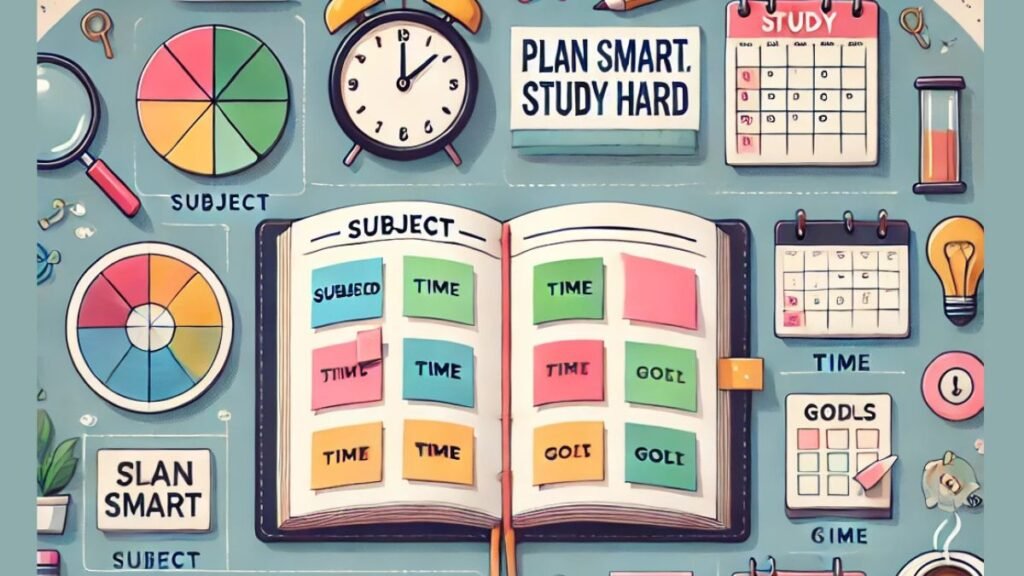How to Study for Competitive Exams: A Complete Guide For Success
Competitive exams are crucial for securing prestigious academic positions, jobs, and scholarships. Whether you’re preparing for entrance exams, government job tests, or professional certification exams, it’s essential to approach the preparation process with a clear plan and strategy. In this article, we will explore what competitive exams are and why proper preparation is crucial. We will also provide actionable tips on how to study effectively for success.

What Are Competitive Exams?
Competitive exams are standardized tests that assess an individual’s knowledge, skills, and aptitude in specific areas. These exams are designed to compare candidates against one another to select the most qualified individuals for college admissions, job recruitment, or scholarships. Some common types of competitive exams include:
Entrance Exams for universities (e.g., JEE, NEET, GRE, GMAT).
Government Job Exams (e.g., UPSC, SSC, Banking exams).
Professional Certification Exams (e.g., CFA, CPA).
These exams often test a candidate’s ability to perform under pressure, solve complex problems, and demonstrate subject-matter expertise.
Why Preparing for Competitive Exams Is Important
Proper preparation for competitive exams is not just about passing the test—it’s about opening doors to numerous opportunities. Here’s why preparation is so crucial:
Career Opportunities: A strong performance in competitive exams can lead to admission to top-tier universities, securing a prestigious government job, or landing a high-paying corporate role.
Skill Enhancement: The preparation process strengthens essential skills like time management, problem-solving, decision-making, and working under pressure.
Building Confidence: Solid preparation helps build self-confidence, reducing anxiety on exam day and increasing the chances of success.
Mental Toughness: Competitive exams require resilience and the ability to stay calm under stress, which is a valuable skill in any career.
How to Study for Competitive Exams
Effective preparation for competitive exams requires a structured approach. Here are some essential steps to help you study smart and perform well.
-
Understand the Exam Pattern and Syllabus
Before starting your preparation, it’s crucial to fully understand the exam pattern and syllabus. This helps you focus on the right topics and avoid wasting time on irrelevant material.
Exam Pattern: Learn about the number of sections, types of questions (MCQs, descriptive), marks allocation, and the time duration for each section.
Syllabus: Get a copy of the syllabus for each subject you will be tested on. Break down the syllabus into manageable topics.
You can find this information on official exam websites or through textbooks and online resources.
-
Create a Study Plan For Effect
A study plan is the backbone of effective exam preparation. Creating a detailed plan ensures that you stay on track and cover all essential topics.

Weekly and Monthly Goals: Break your syllabus into smaller chunks and set weekly or monthly goals. Allocate time to each subject based on your strengths and weaknesses.
Daily Schedule: Create a daily study timetable. Make sure to include breaks to avoid burnout.
A solid study plan helps you stay organized and motivated, ensuring that you don’t miss any important topics.
-
Time Management
Time management is essential for making the most of your study hours. Without proper time allocation, it’s easy to get overwhelmed.
Pomodoro Technique: Use the Pomodoro Technique (study for 25 minutes, then take a 5-minute break) to stay focused.
Prioritize Tasks: Focus on your most challenging subjects first when you are fresh and alert. Dedicate more time to weak subjects, but make sure to revise your strengths as well.
Balancing your study time effectively will help you cover the entire syllabus without feeling rushed.
-
Focus on Conceptual Understanding
Competitive exams often require a deep understanding of the subject matter, not just rote memorization. Focus on concepts to ensure you can solve any problem in the exam, even if it’s a tricky one.
Clear Fundamentals: Start with the basics and work your way up to more complex topics. Ensure you understand the core concepts before moving forward.
Use Visual Aids: Mind maps, charts, and diagrams can help reinforce understanding. Create visual aids to break down complex topics.
By focusing on conceptual clarity, you’ll be prepared for any question that might come your way.
-
Practice and Take Mock Tests
Practice is key when preparing for competitive exams. The more questions you solve, the better your chances of success.
Mock Tests: Regularly take mock tests to simulate the actual exam environment. This helps you get used to the exam’s time pressure.
Analyze Mistakes: After each test, review your mistakes and understand why you made them. This allows you to improve in weaker areas.
Previous Years’ Papers: Solve previous years’ question papers to get an idea of the types of questions that are likely to appear in the exam.
Mock tests and practice papers help you gain confidence and develop effective exam strategies.
-
Stay Healthy and Avoid Burnout
While studying is important, maintaining your health is equally essential. A healthy mind and body are necessary for peak performance during exams.

Take Regular Breaks: Don’t study for hours without taking short breaks. Use Study breaks to stretch, meditate, or go for a short walk.
Eat Nutritious Food: Fuel your brain with a balanced diet that includes fruits, vegetables, and proteins. Avoid junk food, as it can make you feel sluggish.
Sleep Well: Make sure you get 7-8 hours of sleep every night. Lack of sleep can affect your memory and concentration.
Staying physically and mentally healthy is critical for long-term success in competitive exams.
Resources for Competitive Exam Preparation
To help you study effectively, here are some resources you can use:
Books: Use recommended books for each subject and exam. For example, NCERT books are essential for many Indian exams.
Online Platforms: Websites like BYJU’s, Unacademy, and Coursera offer courses and mock tests for various competitive exams.
YouTube Channels: Channels like GradeUp, Khan Academy, and Unacademy provide free tutorials and exam-specific tips.
Study Groups: Join online study groups on platforms like Reddit, Facebook, or Telegram to stay motivated and share resources.
Common Mistakes to Avoid While Preparing
Many students fall into the trap of making common mistakes during their exam preparation. Here’s what you should avoid:
Procrastination: Waiting until the last minute to study can lead to anxiety and poor performance.
Overloading: Don’t try to study too many subjects at once. Stick to your study plan.
Ignoring Weak Areas: Focus on your weak subjects and allocate more time for them.
Not Practicing Enough: Merely reading textbooks without solving problems won’t prepare you for the exam.
Staying Motivated During Exam Preparation
Staying motivated throughout your exam preparation can be challenging. Here are some tips to keep your spirits high:
Set Small Achievable Goals: Break your study sessions into small, achievable tasks. This gives you a sense of accomplishment.
Reward Yourself: Treat yourself when you achieve a goal, whether it’s completing a chapter or taking a mock test.
Stay Positive: Remember that challenges are part of the process. A positive mindset will help you overcome difficulties.
Conclusion
Preparing for competitive exams can be overwhelming, but with the right strategies and mindset, you can succeed. Understand the exam pattern, create a solid study plan, manage your time effectively, and practice consistently. Above all, remember to maintain your health and stay motivated. Good luck on your journey to exam success!